|
|
|
Sort Order |
|
|
|
Items / Page
|
|
|
|
|
|
|
| Srl | Item |
| 1 |
ID:
131095
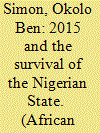

|
|
|
|
|
| Publication |
2014.
|
| Summary/Abstract |
Nigeria is currently faced with serious domestic challenges. While the state is not officially at war, it is standing on the precipice, especially with the eruption of violence occasioned by the emergence of the Boko Haram sect and the tenuous peace in the Niger Delta. With the 2015 general elections on the horizon, fears of further violence and disintegration are rife, more so because of the debate over who occupies the Presidential Villa at Abuja. President Goodluck Jonathan, a southerner, seems poised for a comeback even amidst the vociferous challenge posed by the political elites of northern Nigeria. This article looks at the different scenarios that might play out in 2015. It analyses the challenges of the survival of the Nigerian state, and makes some policy recommendations that Nigeria and its people need to put into place in order to ensure its survival beyond 2015.
|
|
|
|
|
|
|
|
|
|
|
|
|
|
|
|
| 2 |
ID:
093811
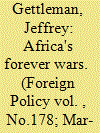

|
|
|
| 3 |
ID:
107801
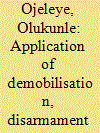

|
|
|
|
|
| Publication |
2011.
|
| Summary/Abstract |
The oil- and gas-rich Niger Delta region, plagued by violence and dominated by armed militant gangs, typifies the new face of conflict which second generation demobilisation, disarmament and reintegration (DDR) approaches are meant to address at the sub-national level. Fundamental to the emergence of militant gangs and the militarisation of civil society in Nigeria is the federal system of government and its attendant political, social and economic imbalances. This article advances the argument that the implementation of a detailed DDR programme that addresses the governance, ethnic politics, resource control, revenue distribution and national integration issues at the root of the tensions in the troubled oil- and gas-rich region will yield a greater peace dividend for all stakeholders in contrast to the current amnesty programme of the Nigerian government. This programme has been fraught with setbacks and mistrust from its client group (the militants). In so doing, DDR at the sub-national level in the Niger Delta would serve as a tool to achieve peace and long-term stability in the nation not only by removing the tools of violence - weapons and ammunition - from the militants and the civilian population but also by removing the sources of violence as reflected in socio-economic and political inequality within the Nigerian state.
|
|
|
|
|
|
|
|
|
|
|
|
|
|
|
|
| 4 |
ID:
091179
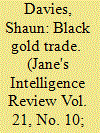

|
|
|
|
|
| Publication |
2009.
|
| Summary/Abstract |
Decades of oil production have generated hundreds of billions of dollars in revenues but have left a legacy of social disharmony, economic underdevelopment and environmental degradation in the Niger Delta. This has inspired a complex and inter-related nexus of criminal and militant activity in the region.
|
|
|
|
|
|
|
|
|
|
|
|
|
|
|
|
| 5 |
ID:
103807
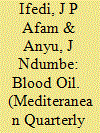

|
|
|
| 6 |
ID:
115425


|
|
|
| 7 |
ID:
161528
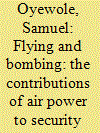

|
|
|
|
|
| Summary/Abstract |
There is a growing resort to air power in Nigeria’s military and security engagements in the oil producing region of Niger Delta. However, most literatures on security engagements in the region overlook air power, or reduce it to unnecessary flying and indiscriminate bombing of civilians. Air power plays a considerable role in surveillance and coercion against the menace of kidnapping, sabotage, oil theft and illegal oil refining, militancy, and armed robbery against ships in the Niger Delta and associated piracy off the coasts of Nigeria, its neighbours and the Gulf of Guinea. It is also involved in strategic transportation, search and rescue/relieve of endangered civilians (e.g. hostages) and to an extent victims of natural disasters (e.g. floods). This article seeks to examine the threats to security in Nigeria’s Niger Delta, and the relevance of air power in the arrangement of security responses and disaster management in the region.
|
|
|
|
|
|
|
|
|
|
|
|
|
|
|
|
| 8 |
ID:
123283
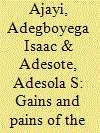

|
|
|
|
|
| Publication |
2013.
|
| Summary/Abstract |
The amnesty programme initiated by the Yar'Adua/Jonathan administration to placate militants in the oil-rich Niger Delta region, though reactive - like previous governments' strategies - has ensured relative peace in the region thereby bringing oil production to its maximum level thus far. But painfully this has not translated to a better life for the vast majority of those living in the Niger Delta who are not included in the amnesty programme. In this study, based on descriptive analysis, we aim to demonstrate: (i) the futility of the previous government's strong-arm measures in the management of the Niger Delta crisis and how this led inadvertently to the evolution and radicalization of militant groups that needed to be placated in order to curtail their heightened disruptive activities; and (ii) the amnesty programme adopted for this purpose is a short term expediency that could not address the myriad problems confronting the Niger Delta comprehensively. This implies that more broad-based programmes, targeted at the rapid development of the area, creation of job opportunities, environmental restoration and robust support for sustainable socio-economic endeavours geared towards self-reliance, would have to be proposed in order to ensure lasting peace in the region.
|
|
|
|
|
|
|
|
|
|
|
|
|
|
|
|
| 9 |
ID:
122808
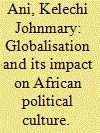

|
|
|
| 10 |
ID:
111813
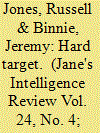

|
|
|
| 11 |
ID:
138122
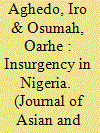

|
|
|
|
|
| Summary/Abstract |
The Niger Delta militancy and Boko Haram insurgency pose the greatest security threat to Nigeria since the end of the civil war in 1970. This article places both rebellions in comparative perspective. It argues that, though spatially and ideologically differentiated, both insurgencies are products of the dysfunctional character of the Nigerian state. Owing to poor governance, the state relies essentially on repression and the military option in managing challenges to its legitimacy, leading to the radicalization of violent non-state actors. The article recommends the need for developmental politics and a critical re-examination of the National Question to make the state more relevant to the people.
|
|
|
|
|
|
|
|
|
|
|
|
|
|
|
|
| 12 |
ID:
094765
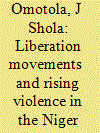

|
|
|
|
|
| Publication |
2010.
|
| Summary/Abstract |
The contest for the 'soul' of oil and its revenues in Nigeria have thrown up several actors representing diverse interests, most notably the stale, oil multinationals and oil-hearing communities. This paper is primarily concerned with what it called the new contentious site of oil and environmental polities in the Niger Delta. The contention revolves mainly around the interpretations ascribed to the current but unprecedented wave of violence in the region by the contending forces in oil and environmental politics. In the reading of militias' activities, there is a simultaneous convergence and divergence between the state and the oil majors. Both refuse to attribute rising violence to liberation struggles, as claimed by the militants. They, however, differ over the best tactical approach to the problem. The oil majors seem to prefer a more violent approach to taming the monster, which violence in the Niger Delta has become. This is in sharp contradiction to the states' preference for a relatively less violent approach. This 'new' disposition of the state makes it all the more interesting, given the fact that the Nigerian state is notoriously reputed for its excesses in the Niger Delta over dissent. Overall, rising violence in the Niger Delta represents the continuation of the resource struggle by another means. Notable criminal tendencies became inevitable due to the insensitivity of the government and in order to sustain the struggle.
|
|
|
|
|
|
|
|
|
|
|
|
|
|
|
|
| 13 |
ID:
107326
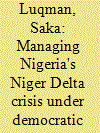

|
|
|
|
|
| Publication |
2011.
|
| Summary/Abstract |
Since the return to civil rule, the Niger Delta has witnessed increasing dissent in the form of an armed insurgency with the attendant criminal activities. The Nigerian state has sought to manage the region's crisis using both conciliatory and militarist approaches with little success. Drawing insights from in-depth interviews, newspaper interviews, commentaries and editorials, this article assesses the utility of military deployment in containing the crisis. While recognising the need for securing oil installations, the scale of avoidable civilian casualties raises questions about the utility of military engagement in managing the Niger Delta crisis.
|
|
|
|
|
|
|
|
|
|
|
|
|
|
|
|
| 14 |
ID:
114832
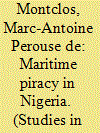

|
|
|
|
|
| Publication |
2012.
|
| Summary/Abstract |
Focused on maritime piracy in the oil-producing Niger Delta (Nigeria), this article addresses three main questions. First, how can we measure the escalation or decrease of criminal violence at sea? Secondly, what is the relationship between piracy and the (permanent) crisis of the state in Africa? Finally, what is the relationship between violence at sea and conflicts onshore? Actually, there are not enough data to monitor the real trend of maritime piracy in Nigeria. Another difficulty is that statistics and the international community focus on attacks against "big" commercial boats and the oil industry. As a result, they ignore "small" trawlers and fishermen who are the first victims of pirates in terms of homicides. Moreover, quantitative monitoring does not give details on the political economy of piracy. Too often, security analysts provide simplistic explanations that point to usual stereotypes on Africa: poverty, the failure of the state, etc. But the problem is more complex. The modernization of maritime piracy is different from a quantitative growth and has a lot to do with the local dynamics of political conflicts and crime in the oil-producing coastal states of Nigeria.
|
|
|
|
|
|
|
|
|
|
|
|
|
|
|
|
| 15 |
ID:
097672
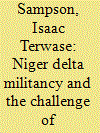

|
|
|
|
|
| Publication |
2009.
|
| Summary/Abstract |
This article examines the dilemma of the Nigerian Legislature in enacting legislation
on terrorism with regard to the Niger Delta militancy. It argues that although Nigeria
requires legislation on terrorism, such efforts should take cognisance of its peculiar
sociopolitical and legal development. It warns that a Western approach to terrorism
legislation may exacerbate violence in the Niger Delta in view of the people's persistent
opposition to anti-terrorism legislation as a government ploy to criminalise their
campaigns for justice. It further contends that in spite of its criminal manifestation, the
Niger Delta crisis stems from genuine grievances about amongst others sustained state
neglect, protracted desecration of the local environment and destruction of sources of
livelihood. The article concludes by offering political and legal strategies for combating
terrorism in Nigeria without exacerbating the Niger Delta situation.
|
|
|
|
|
|
|
|
|
|
|
|
|
|
|
|
| 16 |
ID:
082939
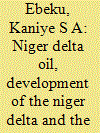

|
|
|
|
|
| Publication |
2008.
|
| Summary/Abstract |
Niger Delta oil contributes immensely to the well-being of the Nigerian State; yet the Niger Delta region remains underdeveloped and its indigenous inhabitants are among the poorest in Nigeria, leading the frustrated indigenous people to engage in frequent oil-related protests. Previous development bodies, such as the Niger Delta Development Commission (NDDC), have failed to bring development to the region for various reasons. This article seeks to consider the Consolidated Council on Social and Economic Development of Coastal States of the Niger Delta (COSEND) - a new development institution recently established by the Government of Nigeria to drive the development of the Niger Delta region - with a view to determining whether it could succeed where similar bodies had failed in the past
|
|
|
|
|
|
|
|
|
|
|
|
|
|
|
|
| 17 |
ID:
110319
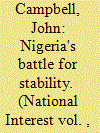

|
|
|
|
|
| Publication |
2012.
|
| Summary/Abstract |
RECENT EVENTS in Nigeria, including its presidential elections last April, have produced two narratives on the current state of that oil-rich West African nation with a history of civic turmoil. The first is that events there have unfolded rather favorably since its elected president, Umaru Yar'Adua, fell ill in late 2009 and the country was left leaderless. That raised fears of a military coup, but then Goodluck Jonathan emerged to fill the power vacuum, first as an extraconstitutional "acting president," then as a constitutional successor after Yar'Adua's death and finally as the elected executive following the 2011 elections. This optimistic narrative notes that those elections were praised by international observers as better than in the past-and hence they reflected the will of the national majority. An amnesty for militants in the oil-rich Niger Delta, combined with disarmament, training and reintegration, ended a long insurrection there. One serious specter, however, still haunts the country-the expansion of the Islamic "terrorist group" Boko Haram, with its global connections. Hence, Nigeria's security challenge has become internationalized, and Westerners grappling with Islamist movements need to keep a sharp eye on that situation.
|
|
|
|
|
|
|
|
|
|
|
|
|
|
|
|
| 18 |
ID:
142523
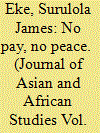

|
|
|
|
|
| Summary/Abstract |
The peace accord between the Federal Government of Nigeria and the Niger Delta (ND) militants, within the framework of the 2009 amnesty programme, immediately yielded positive results. Daily oil production, which had drastically declined to an all time low of 1.4 million barrels, soon shot up to 2.2 million barrels as the deal restored relative calm in the region. In recent times, however, the seeming peace in the region has disappeared, to the consternation of those who had touted a DDR approach to the conflict in Nigeria’s oil ‘republic’. Kidnapping, for ransom in the region, shifted from high profile abduction to anyone in society that can offer a price. More than any other explanation, this article locates the resurgence of violence in the region in the fault lines of the DDR programme implemented in 2009. The author contends that the deal was a ‘cash for peace’ programme cloaked in ‘amnesty’; which has inadvertently created a violence appeal for those who seek a slice of the so-called ‘national cake’.
|
|
|
|
|
|
|
|
|
|
|
|
|
|
|
|
| 19 |
ID:
124490
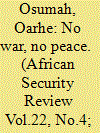

|
|
|
|
|
| Publication |
2013.
|
| Summary/Abstract |
The armed conflict over crude petroleum oil in the Niger Delta has raged for several decades. A host of peace initiatives have been adopted by the Nigerian state to address it, but with minimal impact. The amnesty offer to repentant militias in 2009 by President Umaru Yar'Adua's administration is one of the most recent and broadest peace initiatives by the Nigerian government intended to end the general tendency to warfare and the absence of peace in the Niger Delta. This article, based on secondary sources of data, examines the components of the amnesty, its critical problems and their implications for peacebuilding in the Niger Delta. It finds that though the programme has engendered relative peace, the issues and grievances that occasioned the general tendency to warfare and absence of peace in the region - such as inequitable distribution of oil revenue, environmental degradation, and underdevelopment - are not properly articulated in the disarmament, demobilisation, and reintegration components of the programme. Thus, it holds that the prevailing situation in the region largely approximates a swinging pendulum of no war, no peace.
|
|
|
|
|
|
|
|
|
|
|
|
|
|
|
|
| 20 |
ID:
133615
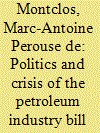

|
|
|
|
|
| Publication |
2014.
|
| Summary/Abstract |
The Nigerian Petroleum Industry Bill (PIB), which is currently being discussed in Parliament, aims at reforming the oil industry. But it also reveals the guiding forces of local politics. The PIB exposes the limitations of the state's ambitions, desire and capacity for reform, and it is strong evidence for the regional divisions and social tensions catalysing resistance against the government of President Goodluck Jonathan, which is accused of ethnic bias in favour of the oil-producing areas of the Niger Delta.
|
|
|
|
|
|
|
|
|
|
|
|
|
|
|
|
|
|
|
|
|